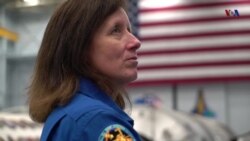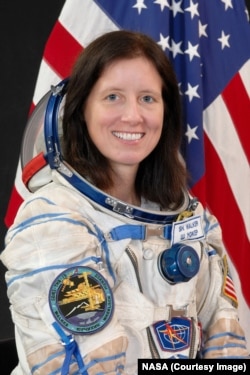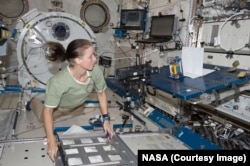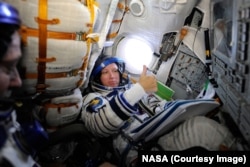What is space? Shannon Walker says there are many answers to this question.
“We have stars, planets and galaxies in space. There’s lots of nothingness out there, but it’s really not,” she says. “There’s gas, dust and other bits of matter floating around ‘emptier’ areas of the universe, but you can’t see it very easily.”
Walker is an astronaut with NASA, the US space agency. She lived and worked for six months on the International Space Station in 2010. Walker says her ride to and from the space station was on a Soyuz spacecraft, for which she trained as a co-pilot, and flew with the Russians.
“I spent a lot of time in Russia training and learning how to fly that spacecraft. I was fully trained just like the commander to do everything that needed to be done, so that was exciting,” she says. Learning how to and being expected to know how to fly an international partner vehicle is quite something, especially having to do it all in Russian,” Walker says.
Walker says seeing the Milky Way from the space station is a beautiful thing. She says without atmosphere and clouds blocking your view, the number of stars and the colors you can see is incredible.
Walker adds that rocketing to space and back produces some one of a kind feelings.
“You're sitting on a launch pad a couple of hours before you take off, and you've done all your system checks, and you're waiting and you're waiting. And then shortly before the launch, you can hear the very top of the rocket, and so you can hear things happening beneath you, because all of a sudden the valves are opening and the fuel is starting to flow, and you can sort of hear it and feel it inside the capsule, so you know you were getting ready to go. And then, when the engines light, there's just so much noise and vibrations and you can feel. You know the forces of movement are shoving you back in your seat. Now coming back is sort of a different set of vibrations and noises, because you've been floating for months and months, and then you get into a little tiny capsule to come home and you fire an engine and that’s not really a big deal, but once you start getting into the upper reaches of the atmosphere, you can actually see the way the Soyuz is built,” she says. “It's got a heat shield on the bottom that is designed to burn away. And we've got some windows and so you can see bits of your spacecraft floating off and floating by, and everything's heating up, and you can see sort of the glow of the heat as you're coming through. And so, you know something's happening coming through the atmosphere, and it just gets to be more and more intense as gravity builds up. You start feeling really, really heavy. And then the most exciting time I think is when the parachutes come out. You’re just bouncing around underneath the parachute for a pretty long time before everything settles down, and then you're just gently floating down to the ground. Both are totally exciting and each in a completely different way.”
Born and raised in Houston, Texas, Walker says having the Johnson Space Center nearby stoked her interest in space.
“At a young age, I became interested in space and science after watching the US land on the moon for the first time,” Walker says. I studied physics as an undergraduate, and after I graduated from Rice University, I was actually hired at the Johnson Space Center as a flight controller. Three years later, I went back there for my advanced degree in space physics.”
Walker says being an astronaut means being able to explore the universe and see it firsthand, and being a physicist means wanting to understand the universe. Would she like to go back to space? “In a heartbeat. I would absolutely go back!”









